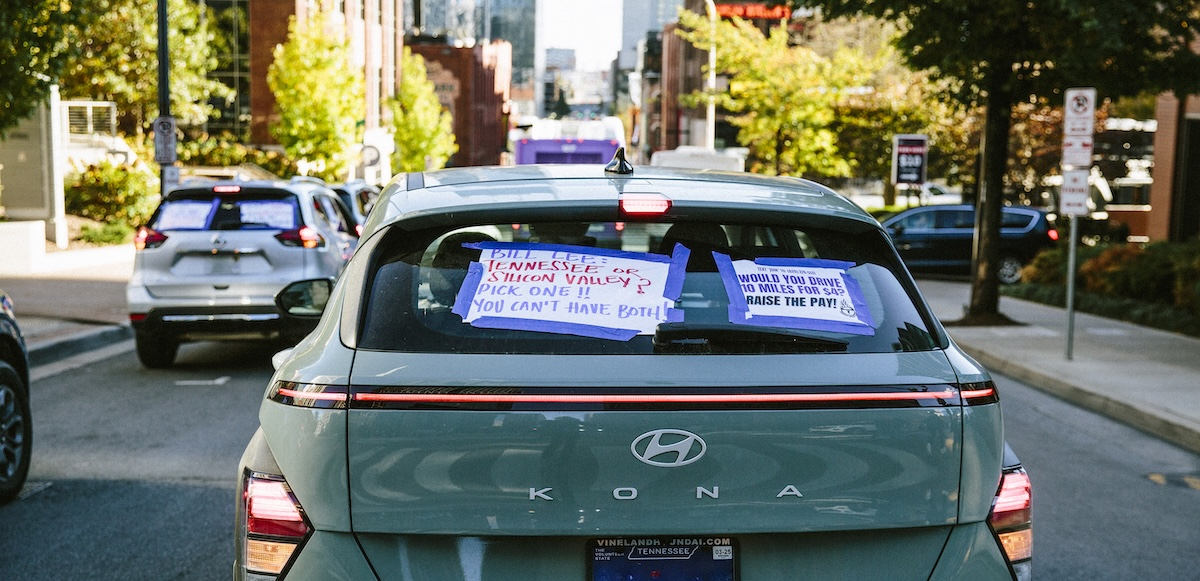I was banned from the Nashville airport for protesting Uber

Members of the Tennessee Drivers Union struck during the Country Music Awards in Nashville, turning off their Uber and Lyft apps and parading with signs on their cars. Rideshare companies cut pay drastically and are now trying to squash organizing. Photo: TDU
On February 14, I joined 50 other Uber and Lyft drivers, all of us members of the Tennessee Drivers Union, in a peaceful caravan at the Nashville airport to protest our low pay and dismal working conditions. Our action, which took place on public property and when our rideshare apps were turned off, coincided with Valentines Day protests by rideshare unions across the country.
A few days later, 34 of us received emails and text messages from Uber and Lyft informing us that we were permanently banned from pick-ups at the Nashville airport. The rideshare companies falsely accused us of unlawfully picking up passengers at the arrivals level of the airport.
We believe this action is in retaliation for our protest, perhaps the largest retaliation against rideshare driver organizing in the U.S. Lawyers tell us that the action violates our right to free speech.
Since being banned from the airport, my income has plummeted. Even working 10-12 hour days, I now earn only about $100 a day. I pay $430 a week to rent a car from Uber. Some weeks, I take home no money at all. Now Uber is blocking me from logging on to pick up rides even outside the airport, and when I can log on, rides often don’t come through.
Uber, Lyft, and the Metro Nashville Airport Authority are trying to intimidate us and slow our organizing progress.
PAY DROPPED
I’ve been an Uber driver in Nashville since 2017, and used to make a decent living at it. But then Uber went public, and the pandemic happened. Uber and Lyft changed how they calculated driver pay, giving jobs to the driver willing to take the lowest-paying ride.
Meanwhile, both companies began luring drivers across state lines, saturating the streets of Nashville, creating horrific traffic congestion, and forcing drivers to compete for the same passengers. (Back in 2015, Uber and Lyft successfully lobbied to exempt rideshare companies from laws governing other commercial driving companies, so drivers no longer need a state license to drive in Tennessee.)
We have almost 50,000 rideshare drivers in and around Nashville. Sometimes we spend more time in traffic on our way to find passengers than we do with passengers. And that time is all unpaid.

SUPPORT LABOR NOTES
BECOME A MONTHLY DONOR
Give $10 a month or more and get our "Fight the Boss, Build the Union" T-shirt.
Last year, when I heard that Uber and Lyft drivers were forming the Tennessee Drivers Union, I joined right up. Since then, I’ve spoken with nearly 200 of my fellow drivers. I’ve seen how we’re all working more hours for less pay and struggling to pay our bills. The union now includes over 300 drivers from 16 different nationalities.
Uber and Lyft treat us like independent contractors, so we have no guaranteed minimum wage or overtime pay and can’t engage in collective bargaining. But since last fall, the union has conducted four successful work stoppages and won real improvements for Nashville rideshare drivers.
We’ve also gotten city and state lawmakers to take action. We got the mayor to stop the Nashville Department of Transportation from ticketing and harassing rideshare drivers working downtown. Rideshare zones are now part of the city’s transit plan. After a work stoppage downtown, we won attention from state legislators, and now there’s a bill that would end the unfair situation that drivers in other states can pick up rides in Tennessee, but Tennessee drivers can’t pick up rides in other states.
Uber and Lyft spend millions of dollars each year trying to keep their drivers from organizing. Across the country, they’ve poured resources into anti-worker legislation, seeking to lock rideshare drivers and other gig workers out of labor protections. They even formed their own company union in at least three states to quash legitimate worker organizing.
Like the rideshare companies, the Metro Nashville Airport Authority profits off our labor. In 2023, the airport collected $2.4 million from fees paid by Uber and Lyft drivers. That money could be used to cover cleaning fees for the port-a-potties we use or to improve the airport’s rideshare lot, which can barely fit enough drivers to meet the demand. Instead, executive salaries are the priority. Doug Kreulen, the authority’s CEO, makes $600,000 a year.
On March 19, my fellow union members and I delivered a letter to the Airport Authority board, signed by 37 unions, condemning the airport’s alliance with Uber and Lyft.
Rideshare unions from six states signed on, including the New York Taxi Workers Alliance, the California Rideshare Drivers United, as well as rideshare unions in India and Costa Rica. Teamsters Local 327, CWA Local 3808, SEIU Local 205, the Metro Nashville Education Association, and the United Campus workers of Tennessee also signed, along with the national Amazon Labor Union and United Electrical, Radio, and Machine Workers of America.





